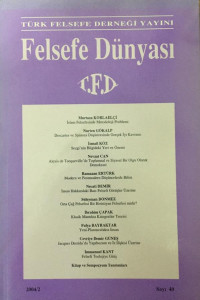Abstract
mekânını terk etmiş değildir.7 Ancak Ruh, kendisinin bu imajına ikinci kez bakar ve bu imaja hayran olarak, ontik ve etik anlamda kendisinden daha aşağıda olan bu imaja doğru atılır.8
References
- Plotinus, The Six Enneads, Trans. Stephen MacKenna and B. S. Page, published by William Benton, U.S.A., 1952
- Proclus’ Commentary on Plato’s Parmenides, Trans. Glenn R. Morrow and John M. Dillon, Princeton Un. Pres, 1987
- Copleston, F. S. J., A History of Philosophy, Vol. 1, Search Pres, London 1946
Abstract
Behind the efforts of interpreting the being of man lies the idea that man is not only a physical being but also a metaphysical being. Regarding the man from the point of such a perspective places him at a privileged point in the universe. Among the thinkers who interpret man this way and determine him as the basis and goal of the universe are the Neo-Platonists. In this study, man will be analysed according to the philosophies of Plotinus who is known to be the first founder of Neo-Platonism as a system and Proclus who is said to have perfected the system. According to the aforementioned philosophers, the universe consists of the stages of a circular evolution that has startet finally to return to the “One Being” from which it has originally been emanated. Man is, in this respect, at the point of returning to that “One Being”.He is at a point where the universe emanating from the “One Being” has returned to it. Since it is a circular movement ,he is at the point where one can also witness the initiation of the movement. That is, man is a being that the “One Being” can contemplate itself in him and that he can contemplate it in himself. Man who is the subject matter of contemplation of the “One Being” ontologically is perfect in himself for the Neo-Platonists.However, the reaching of man at this level individually is possible by participating the movement of perfection, which is the ethical mission imposed on man by the Neo-Platonists.
References
- Plotinus, The Six Enneads, Trans. Stephen MacKenna and B. S. Page, published by William Benton, U.S.A., 1952
- Proclus’ Commentary on Plato’s Parmenides, Trans. Glenn R. Morrow and John M. Dillon, Princeton Un. Pres, 1987
- Copleston, F. S. J., A History of Philosophy, Vol. 1, Search Pres, London 1946
Details
| Primary Language | Turkish |
|---|---|
| Journal Section | Research Article |
| Authors | |
| Publication Date | December 1, 2004 |
| Published in Issue | Year 2004 Issue: 40 |
Philosophy World is licensed under a Creative Commons Attribution-NonCommercial 4.0 International License.


